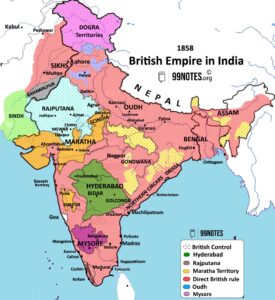23 February 2024 : The Hindu Editorial Notes PDF
The Hindu Editorial
23-February-2024
1. The government must keep the regulatory environment of space sector clear
| Topic: GS2 – Governance – Government policies – Interventions for development in various sectors Crucial for UPSC as it covers India’s space sector reforms, geopolitical strategy, and global competition in technology and innovation. |
| Context |
|
Evolution of Space Exploration Narratives:
- Space exploration has evolved from a romantic notion to a field with financial, socio-economic, and geopolitical implications.
- Private sector involvement is now crucial, challenging the traditional dominance of national agencies.
India’s Space Sector Reforms (2020-2023):
- In 2020, India initiated state-led reforms opening the space sector to private companies.
- Geospatial Guidelines, Indian Space Policy, and the creation of IN-SPACe followed, promoting private sector participation.
- The Telecommunications Act 2023 allowed for satellite broadband services, signalling a comprehensive approach.
FDI Opening Doors (February 21, 2023):
- The Indian government allows 100% FDI in the manufacturing of satellite components and systems.
- Up to 74% FDI permitted in satellite manufacturing, operations, and data products; up to 49% in launch vehicles, space ports, and related systems.
Strategic Advantages and Catching up with China:
- India aims to leverage foreign ties for substantial FDI, positioning itself strategically against China in the global space race.
- China’s space program faces challenges in attracting foreign investments due to belligerent foreign policies and military modernization efforts.
Impacts on India’s Space Economy:
- The decision enhances India’s ability to compete globally, attracting investments to space start-ups.
- Increased access to talent and capital, balancing upstream and downstream opportunities, boosting local manufacturing, and improving investor confidence are expected outcomes.
Sustaining Positive Trends:
- To sustain the positive changes, the government needs to maintain a clear regulatory environment, reduce red tape, garner public support, and facilitate Indian companies’ access to foreign markets.
- Ongoing efforts are crucial for fostering a dynamic and thriving private space sector in India.
Conclusion:
- This strategic move positions India to capitalize on the evolving dynamics of the global space industry, fostering innovation, competitiveness, and economic growth.
| Regulation of Space Sector in India |
Need for Regulation:
Challenges:
Way Forward:
|
| PYQ: Discuss India’s achievements in the field of Space Science and Technology. How the application of this technology has helped India in its socio-economic development? (200 words/12.5m) (UPSC CSE (M) GS-3 2016) |
| Practice Question: How do India’s recent space sector reforms and opening to foreign investments align with its strategic goals and global competitiveness? (150 words/10 m) |
2. In a tough world, the beacon of U.K.- India strategic ties.
| Topic: GS2– International relations – Bilateral relations Critical for UPSC as it covers Indo-UK relations, global maritime challenges, defense partnerships, and geopolitical dynamics. |
| Context |
|
Indo-UK Maritime Connections:
- UK and India, as outward-facing, mercantile societies, share historical and contemporary ties through oceanic trade.
- Maritime activities, essential for global prosperity, now extend to underwater data cables supporting online banking and capital flows.
Global Trade Challenges:
- Norms governing maritime behaviour, crucial for global trade, are increasingly under threat globally from the Black Sea to the South China Sea.
- The article emphasizes the need to secure global lifelines of goods and resources flowing across seas amid rising instability.
Operation Prosperity Guardian:
- In response to threats in the Red Sea and Gulf of Aden, the UK, the US, and partners initiated Operation Prosperity Guardian in December 2023.
- The operation aims to defend and protect commercial shipping, addressing threats posed by indiscriminate actions, such as Houthi attacks.
Indo-UK Defence Partnership:
- Recognizing the Indo-Asia-Pacific as the future global economic centre, the UK welcomes the establishment of its tilt policy in 2023.
- Indo-UK defence ties deepen, with increased interactions between British and Indian forces, culminating in visits and exercises.
Defence Industrial Partnership:
- The UK and India’s defence industrial partnership strengthens, encompassing areas like electric warship propulsion, complex weaponry, and jet engines.
- Military education ties, spanning 75 years, are set to be enhanced with Indian Armed Forces officers joining British service academies.
Global Strategy and Coalition Building:
- Emphasizing the historical ineffectiveness of isolationism or coercion, the article underscores the importance of friends, partners, and allies.
- Advocacy for the rules-based International Order, crucial for peace and prosperity, becomes even more vital in an increasingly unstable world.
India as a Valued Ally to UK:
- In the face of challenges, the UK expresses gratitude for India’s friendship, considering it a source of support and strength.
- Both nations are committed to uphold shared values and contribute to the rules-based International Order for global peace.
Conclusion:
- The article comprehensively covers Indo-UK maritime connections, global trade challenges, responses to regional conflicts, deepening defence partnerships, and the collective advocacy for a rules-based international order.
- It underscores the importance of strategic alliances and the shared commitment to peace and prosperity in an evolving global landscape.
| PYQ: The newly tri-nation partnership AUKUS is aimed at countering China’s ambitions in the Indo-Pacific region. Is it going to supersede the existing partnerships in the region? Discuss the strength and impact of AUKUS in the present scenario. (250 words/15m) (UPSC CSE (M) GS-2 2021) |
| Practice Question: How do evolving Indo-UK defense partnerships and joint responses to global maritime challenges contribute to geopolitical stability and security? (250 words/15 m) |
For Enquiry

23 February 2024 : The Hindu Editorial Notes PDF

23 February 2024 : PIB Summary for UPSC

23 Feb 2024 : Indian Express Editorial Analysis

Annexation of Sindh & Punjab by British- Complete Notes for UPSC

Debate on future strategy after Civil Disobedience Movement

Early Political Activities: 1858-1905 [Complete Notes for UPSC]

Peasant Movements in India- Complete Notes for UPSC

Revolt of 1857

Economic Impact of British Rule in India- Complete Notes for UPSC

Revolutionary Nationalism 2.0
Feb 2024 The Hindu 23 February 2024 : The Hindu Editorial Notes PDF The Hindu Editorial
23-February-2024
1. The government must keep the regulatory environment of space…
feb 2024 PIB 23 February 2024 : PIB Summary for UPSC PIB Summary for UPSC
23 February -2024
1. With a focus on promotion of organic exports, APEDA forms…
Indian Express 23 Feb 2024 : Indian Express Editorial Analysis Indian Express Editorial Analysis
23-February-2024
1. A long institutional road
Topic: GS2 – Polity…
Modern India Annexation of Sindh & Punjab by British- Complete Notes for UPSC Annexation of Sindh & Punjab by British
By 1818, the entire Indian subcontinent, except Punjab and…
Modern India Debate on future strategy after Civil Disobedience Movement Debate on future strategy after civil Disobedience movement
In the Aftermath of the withdrawal of the…
Modern India Early Political Activities: 1858-1905 [Complete Notes for UPSC] Early Political Activities: 1858-1905
The revolt of 1857 was the first major large-scale revolt against…
Modern India Peasant Movements in India- Complete Notes for UPSC Peasant Movements in India
Peasant movements in India have been pivotal in shaping the socio-political…
Modern India Revolt of 1857 The Revolt of 1857 was one of the most significant watershed moments during British rule. During this…
Modern India Economic Impact of British Rule in India- Complete Notes for UPSC Economic Impact of British Rule in India
The British Empire in India was highly organized administratively….
Modern India Revolutionary Nationalism 2.0 Revolutionary Nationalism 2.0
Revolutionary Nationalism 2.0 in India marks a pivotal shift towards radical…


